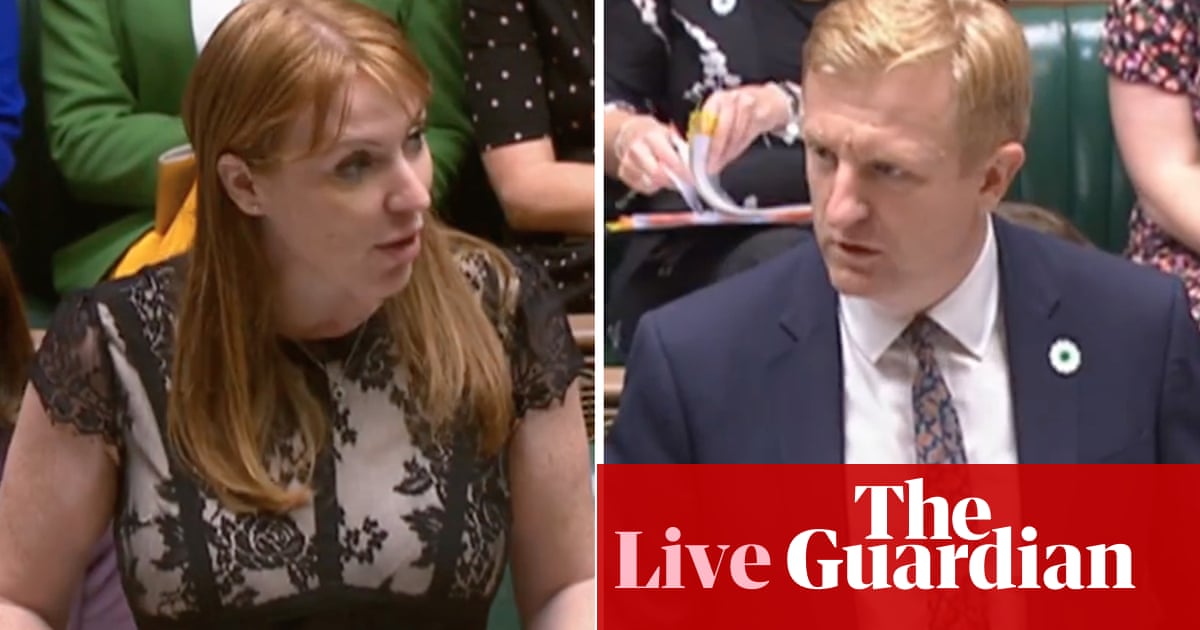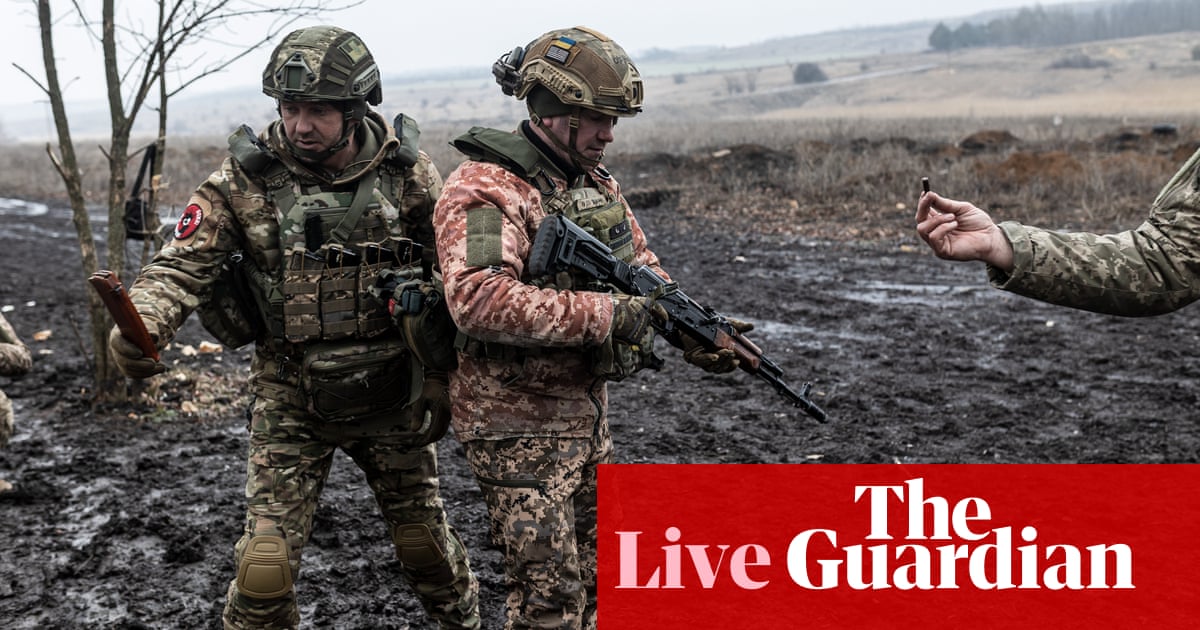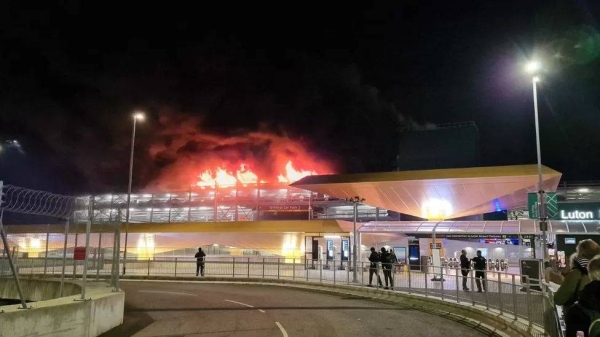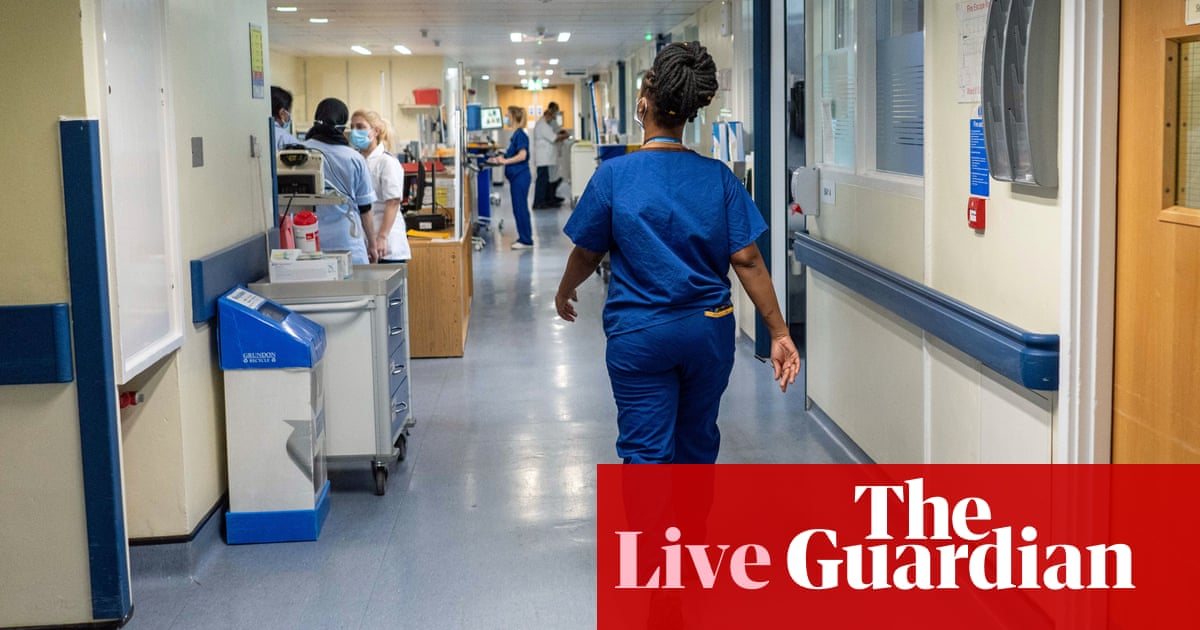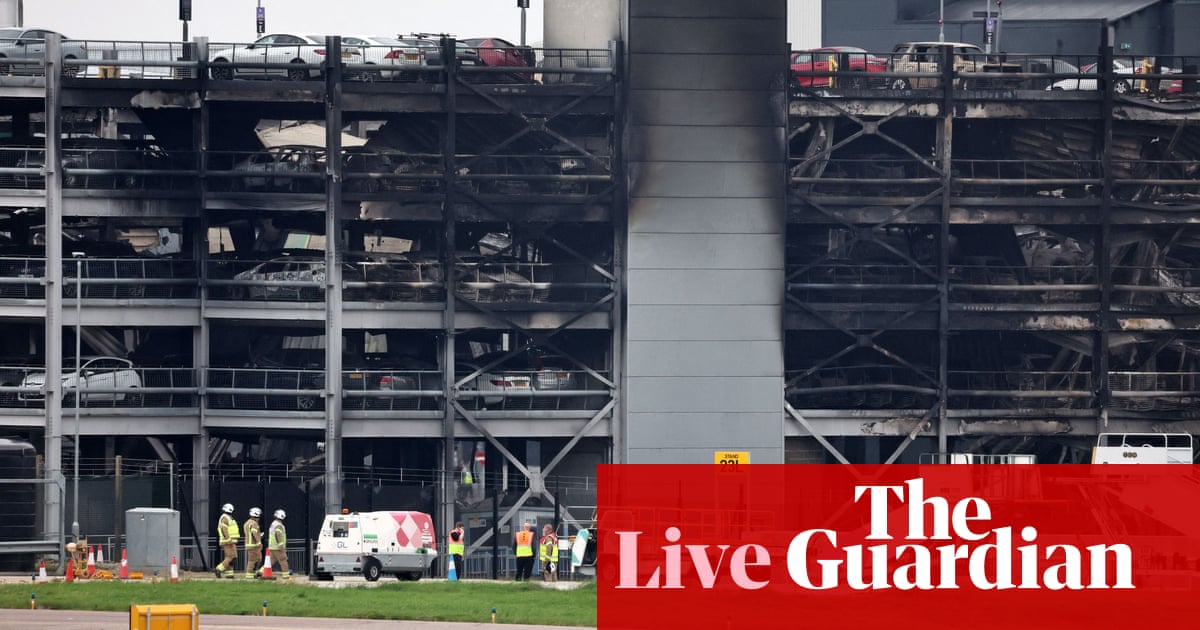
Closing summary
Our top story: Flights have resumed at Luton airport after last night’s huge fire at a multi-storey airport, but many are still delayed.
In New York, Birkenstock shares are due to start trading later today, as the German sandalmaker makes its stock market debut. More here.
UPDATE FROM LUTON AIRPORT:
The runway is now open, and flights are beginning to arrive and depart.
Main roads around the area have also re-opened, but delays are expected on the airport approach.
For those arriving by car, the Long and Mid-stay car parks are fully operational, and a temporary drop-off area has been established in the Mid-stay car park.
For those travelling to the airport by rail, the DART shuttle remains out of service with replacement buses in operation.
Additional staff remain on hand to assist passengers across the airport.
Those with queries relating to a parked vehicle or future booking, in Terminal Car Park 2 and Terminal Car Park 1, should contact luton.customerservices@apcoa.com for support.
Closing summary
Our top story: Flights have resumed at Luton airport after last night’s huge fire at a multi-storey airport, but many are still delayed.
In New York, Birkenstock shares are due to start trading later today, as the German sandalmaker makes its stock market debut. More here.
Russia and Saudi Arabia discuss effect on oil price of Hamas-Israel crisis
Jillian Ambrose
Saudi Arabia and Russia, the world’s top two oil exporters, met on Wednesday to discuss the global market amid fears the conflict between Israel and Hamas could drive crude prices to $100 a barrel.
Before the meeting, the Kremlin’s spokesperson, Dmitry Peskov, stressed the importance of Russia’s coordination with Saudi Arabia and other partners on global oil markets as the crisis in the Middle East escalated.
“Of course, the global oil markets are very sensitive to the events that are currently unfolding around the Palestinian-Israeli conflict, and of course, in this case, our coordination with the Saudis and our other partners ... is difficult to overestimate its importance,” he told reporters.
Russia’s deputy prime minister, Alexander Novak, the Kremlin’s top oil official, and the Saudi energy minister, Prince Abdulaziz bin Salman, met in Moscow ahead of Russia’s energy week conference.
Severe debt burdens thwarting progress on climate and poverty, says World Bank
Reducing poverty and hitting global net zero goals are being hindered by the severe debt burdens on poor countries, the president of the World Bank has said, amid growing concern that high interest rates could cause dozens of countries to default.
Ajay Banga, the new head of the Washington-based body, urged faster progress in providing debt relief but said there was no “magic wand” that could be waved to make the problem go away, at a press conference at the Bank’s annual meeting in Marrakech.
Indermit Gill, the World Bank’s chief economist, said the last time the Federal Reserve had raised interest rates as aggressively as it had recently was more than 40 years ago, and the result was that 24 countries went bankrupt.
Their comments came as the US treasury secretary, Janet Yellen, said she planned to meet the head of China’s central bank, Pan Gongsheng, for talks that would include possible closer cooperation on debt. Relations between Washington and Beijing are frosty but, amid growing pressures on indebted countries as a result of higher global interest rates, Yellen said more help was needed.
Luton airport reopens after huge fire
Luton Airport has reopened after a huge fire caused a car park to collapse, sparking disruption for tens of thousands of passengers.
The Bedfordshire airport suspended flights from when the fire happened at around 9pm on Tuesday until 3pm today. At least 150 flights due to take off or land at the airport were cancelled, according to the PA news agency. A further 27 arrivals were diverted to airports as far away as Cardiff, Liverpool and Manchester, while many other flights were delayed.
The figures suggest more than 30,000 passengers suffered disruption to their journeys.
The fire was declared a major incident, with firefighters working through the night and into the early hours of Wednesday to extinguish the blaze.
Bedfordshire Fire and Rescue Service said it received a report of a car fire on level three of the airport’s Terminal Car Park 2 at 8.47pm. Fifteen fire appliances and more than 100 firefighters were deployed. Three firefighters and a member of airport staff were taken to hospital suffering from smoke inhalation, and another firefighter was treated at the scene.
Andrew Hopkinson, the chief local fire officer, said:
On arrival my officers were faced with a severe and rapidly spreading fire involving a large number of vehicles that ultimately spread to multiple floors and involved a partial collapse of the car park.
He said the car park does not have sprinklers, and if it did they “may have made a positive impact”. He said up to 1,500 vehicles were inside the car park at the time of the fire. The blaze is believed to have started with a diesel-powered vehicle “and then that fire has quickly and rapidly spread”, he said.
AA technical expert Greg Carter said the most common cause of car fires is an electrical fault with the 12-volt battery system. He added that diesel is “much less flammable” than petrol, and in a car it takes “intense pressure or sustained flame” to ignite diesel.
A spokesman for the Association of British Insurers said drivers with fire damage are covered by comprehensive and third-party fire and theft policies. He added it is “too early to estimate the insured cost of the fire”.
A temporary ramp is being installed at the car park to enable undamaged vehicles to be removed.
A Ryanair flight headed to Cork in Ireland has just taken off from Luton Airport, and a Wizz Air service from Cardiff landed safely.
According to the Luton airport schedule on its website, several flights due to depart from the airport now are now estimated to leave at 5pm BST, including an easyJet flight to Agadir, delayed from 3:20pm BST, and a Ryanair flight to Dublin, delayed from 3pm.
I’ve tried to contact the press office for more info.
Birkenstock shares to start trading later
It is unclear when the Birkenstock shares start trading in New York, under the symbol “BIRK”.
The German shoemaker known for producing cork-soled sandals worn by Apple founder Steve Jobs and hippies raised about $1.48bn in an initial public offering, the company said yesterday. Birkenstock set the price of its shares at around the middle of its initial range at $46, valuing the company at $8.6bn.
The sandal brand shed its frumpy image and won the fashion world by storm.
After plodding away successfully for decades the Birkenstock brand hit the big time during the pandemic when the shift to home working saw shoppers seek out companies that offered both comfort and heritage. With workers now back in the office, more relaxed dress codes mean there has been no need to switch back to traditional work attire.
This helped Birkenstock shift 30m pairs last year, with sales up almost 30% to £1.1bn, resulting in a bottom line of £162m.
Mark Carney, the former governor of the Bank of England and now the UN special envoy on climate action and finance, has waded into the row over fossil fuels, saying it wouldn’t be right too shut down existing oil and gas capacity overnight.
Speaking on a climate change panel with the heads of the International Monetary Fund and World Bank at their annual meetings in Marrakech, Carney said:
In economies that have conventional assets - oil and gas - you can’t shut those down overnight. That’s not a just transition. You need to build up the alternatives, you need to work with the communities, train people to undergo the transition.
Carney is currently co-chair of the Glasgow Financial Alliance for net zero, a body which is trying to mobilise private sector capital to invest in net zero projects. The former Threadneedle Street governor said $150t of assets were available to be tapped and said private sector money was already making a difference.
Luton airport tweeted its latest update an hour ago, saying the first passengers were entering the terminal, and the first flights were due to depart from 3pm.
At Luton airport, Andrew Hopkinson, chief fire officer for Bedfordshire Fire and Rescue Service, has explained that the accidental fire was probably started by a diesel vehicle.
Wall Street has opened cautiously higher as expected, while European shares are also drifting higher with the exception of the Paris bourse.
The French CAC has been dragged down by a 5.3% drop in the LVMH share price after the luxury goods giant reported lower sales of Hennessy cognac, and as analysts worried about falling demand as a result of global instability.
Dow Jones up 90 points, or 0.3%, at 33,827
Nasdaq up 64 points, or 0.5%, at 13,625
S&P 500 up nearly 14 points, or 0.3%, at 4,372
Stoltenberg: NATO will mount "determined" response in case of deliberate attack on gas pipeline
Here is an update from Reuters on the leaking gas pipeline between Finland and Estonia.
NATO will discuss damage to a gas pipeline and data cable running between member states Finland and Estonia, and will mount a “determined” response if the cause is proven to be a deliberate attack, NATO Secretary General Jens Stoltenberg said today.
Stoltenberg told reporters in Brussels ahead of a meeting of the military alliance:
The important thing now is to establish what happened and how this could happen. If it is proven to be a deliberate attack on NATO-critical infrastructure then this will be, of course, serious, but it will also be met by a united and determined response from NATO.
According to some report, the pipeline won’t be back until April 2024
With around 1,500 vehicles affected by the huge fire at a Luton airport multi-storey carpark, LV= General Insurance estimates that around 200 customers are affected.
As part of its support, the insurer is guaranteeing customers will get home and be provided with transport in the short term while arrangements are made to quickly settle their claim. In addition, the insurer will be waiving excesses, and promised no claims discounts won’t be impacted for customer. Where possible, LV= will also look to settle claims before customers return to the UK.
Once it’s safe to do so, a team from the insurer will be onsite at Luton airport to provide assistance to affected customers.
Martin Milliner, claims director at LV= General Insurance, said:
As a major insurer we’re here to support customers when the worst happens and we want them to feel supported and protected. That’s why we’re making our promises to ensure any affected customers get home safely and easily when returning to the UK.
Metro Bank gets bondholder support for refinancing
Metro Bank has received enough support from bondholders to push ahead with its debt refinancing plans as part of a rescue package.
The embattled UK lender said it had received more than 75% support commitments from bondholders for its plans to raise £325m in capital, including £150m of new equity from shareholders, and £600m in debt refinancing. The deal was announced late on Sunday.
The Colombian billionaire Jaime Gilinski Bacal is putting in £102m and will become the controlling shareholder with a 53% stake.
Global economic losses from extreme weather could hit $5 trillion
Global economic losses from extreme weather events leading to food and water shocks could total $5 trillion over five years, according to Lloyd’s of London.
The world’s biggest insurance market, in partnership with the Cambridge Centre for Risk Studies, modelled how a hypothetical but plausible increase in extreme weather events, linked to climate change, could lead to breadbasket crop failures and significant global food and water shortages. As the event plays out, societies around the world could see widespread disruption, damage and economic loss.
The research highlights that there is a significant climate risk protection gap, with estimates suggesting that only a third of the global economic losses caused by extreme weather and climate-related risks are currently insured.
Lloyd’s and the centre used a data tool that provides businesses, governments, and insurers with a data-driven, financial impact assessment of the most significant global threats facing society today consider the Gross Domestic Product (GDP) impact of extreme events across 107 countries and at three levels of severity (major, severe, and extreme).
In addition to the global scenario, the data tool includes regional analysis.
As an example, if an extreme event such as this was centred on Greater China, the area which would feel the largest financial impact, it could lead to economic losses of $4.6 trillion over five years. This is followed closely by Asia Pacific at $4.5 trillion. As a percentage share of GDP, the Caribbean would be impacted the most by an event focused on its shores, losing 19% of GDP across the five-year period.
John Neal, the Lloyd’s chief executive, said:
Lloyd’s is committed to building society’s understanding and resilience around systemic risk and protecting our customers against increasing climate threats. It is critical that our market continues to collaborate with the public and private sectors to address this challenge at scale and ensure a sustainable future for all.
We will continue to use our convening power to support global risk resilience, providing risk transfer solutions to support companies and countries in their transition goals.
Dr Trevor Maynard, executive director of systemic risks at the Cambridge Centre for Risk Studies, said:
The global economy is becoming more complex and increasingly subject to systemic threats. We are delighted to work with Lloyd’s, and others, to help businesses and policymakers explore the potential impacts of these scenarios.
However, Lloyd’s has repeatedly come under fire from climate campaigners over its refusal to rein in insurers that are members of the market and still insure fossil projects.
For example, a recent report from the Insure Our Future campaign found that Lloyd’s and other big European insurers are underwriting almost a third of US coal production despite their net zero pledges, according to research, with the Lloyd’s market emerging as the second-biggest player globally.
US factory gate inflation jumps in September
Factory gate inflation in the US has picked up more than expected, according to official figures.
Producer prices rose 2.2% year-on-year in September, far above the 1.6% increase predicted by Wall Street economists.
The core measure, which excludes volatile items like energy and food, rose 2.7%, up from 2.5% and the highest since May.
“Bottom line, inflation is still too high for the Fed,” concluded Jesse Cohen, global markets analyst at Investing.com. He tweeted this handy summary:
Michael McDonough, chief economist at Financial Products, Bloomberg, tweeted this chart:





